“I find it highly ironic that these same tech companies can so quickly and efficiently take down political speech they disagree with no matter who posts it, and yet at the same time cannot take reasonable steps to end massive online copyright piracy.” – Senator Thom Tillis
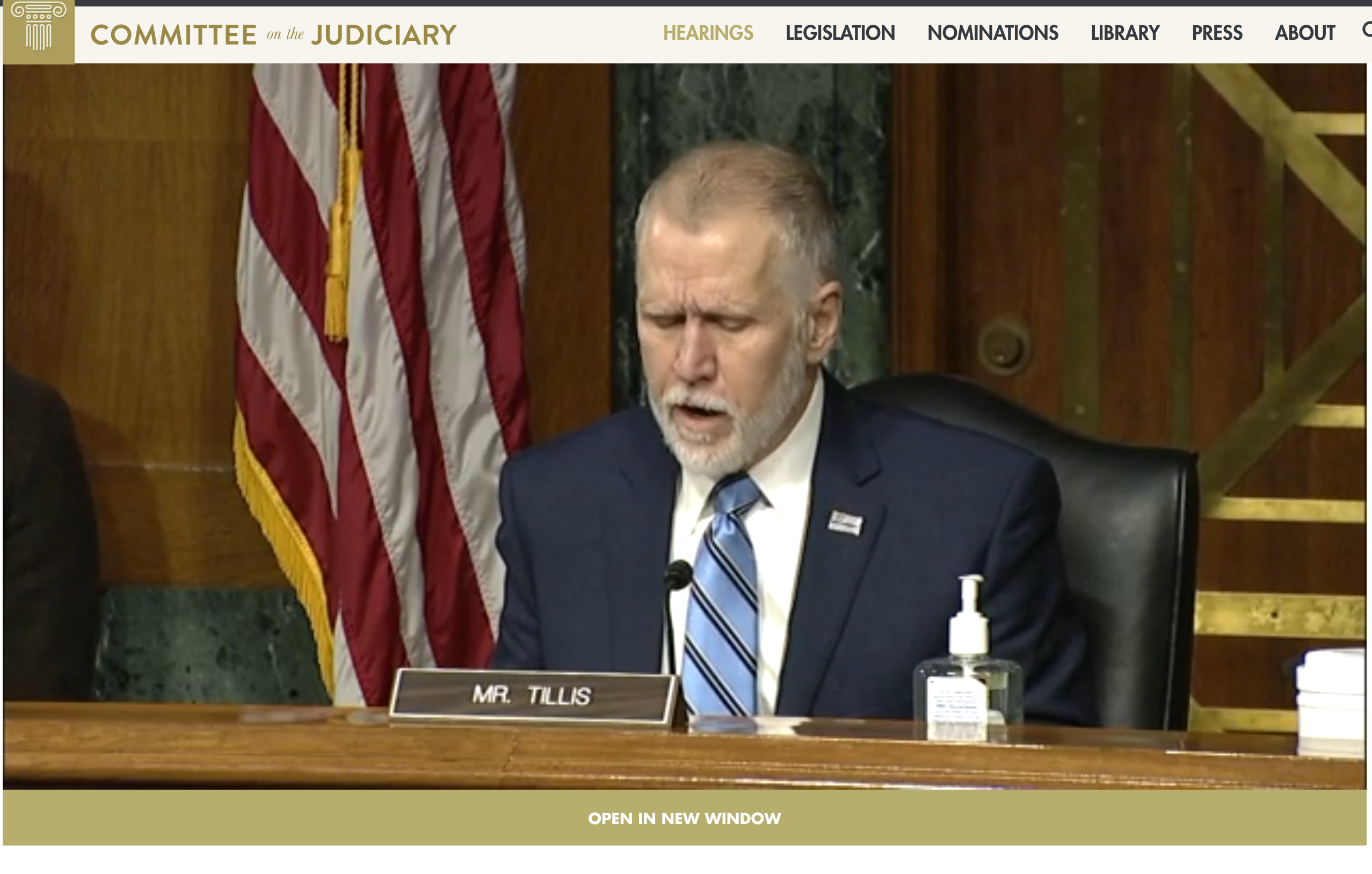 The Senate Judiciary Committee’s Subcommittee on Intellectual Property held its last hearing of the year on reforms to the Digital Millennium Copyright Act (DMCA) today, three days before Subcommittee Chairman Thom Tillis (R-NC) is set to release a discussion draft of a DMCA reform bill he has said will contain “revolutionary changes to online copyright law.”
The Senate Judiciary Committee’s Subcommittee on Intellectual Property held its last hearing of the year on reforms to the Digital Millennium Copyright Act (DMCA) today, three days before Subcommittee Chairman Thom Tillis (R-NC) is set to release a discussion draft of a DMCA reform bill he has said will contain “revolutionary changes to online copyright law.”
Tuesday’s hearing included representatives of YouTube and Facebook; Twitter refused to participate, and Tillis recently published a letter to Twitter CEO Jack Dorsey expressing his disappointment with the decision. The letter indicated that Tillis’ and Dorsey’s staff had been working together for months to identify an appropriate witness, but Dorsey ultimately refused to commit to sending anyone. Tillis told Dorsey that it was critical for the Subcommittee to hear from key online platforms like Twitter for this final hearing of the year, and that “the only reasonable conclusion one can draw from your actions is that Twitter simply does not take copyright piracy seriously.”
In lieu of attending, Tillis demanded that Dorsey submit answers to a series of 12 questions by December 4, which Dorsey did. In his response, Dorsey characterized Twitter as “unique” in the industry in that “as a platform used primarily for conversation, the percentage of media posted overall is much lower, and we currently allow much shorter media clips than those of our industry peers.”
The Irony
In his opening remarks, Tillis took another dig at Twitter—as well as other platforms—when he said, “I find it highly ironic that these same tech companies can so quickly and efficiently take down political speech they disagree with no matter who posts it, and yet at the same time cannot take reasonable steps to end massive online copyright piracy – the cynic would say it’s a testament to their priorities.” He added that the hearings held in 2020 had made it clear to him that “there absolutely is more Big Tech can and should do to stop online piracy.”
However, perhaps recollecting his experience attempting to reform Section 101 of the patent law, Tillis said that, realistically speaking, while reforming the DMCA will be one of his top priorities in the new term, it will likely not happen quickly. Thus, he asked the panelists to describe ways that platforms and rightsholders might cooperate directly now.
Askew, to Say the Least
In the first panel, Mitch Glazier, Chairman and CEO of the Recording Industry Association of America (RIAA), and Ruth Vitale, CEO of CreativeFuture, faced off against Facebook Head of Global IP and Trade Policy, Probir Mehta, while Joshua Lamel of Re:Create represented the internet user’s perspective.
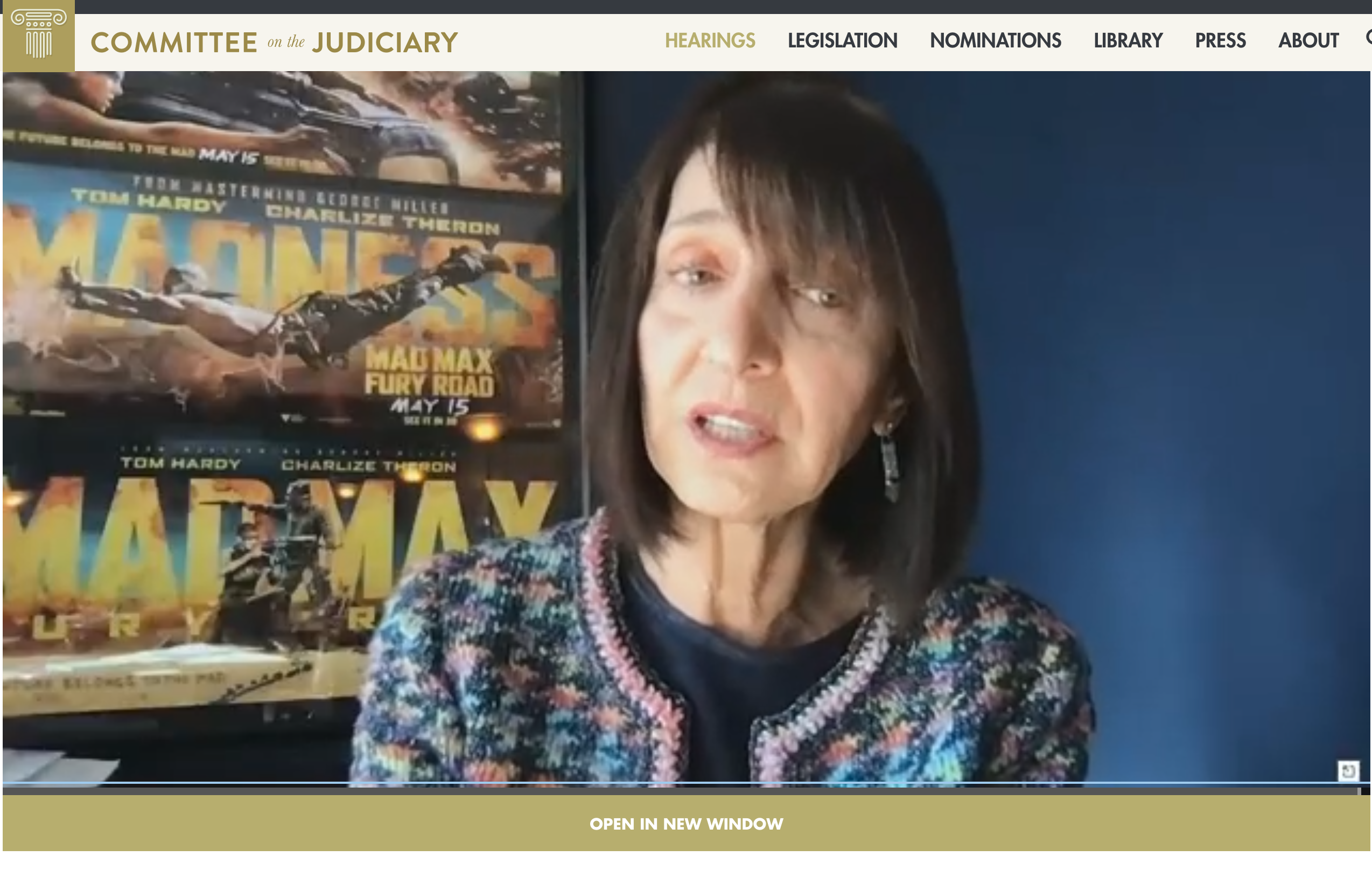
Ruth Vitale, CreativeFuture
Vitale said that Big Tech is facilitating theft, the DMCA does not work, and that platforms should adopt voluntary measures to improve the situation. She and Glazier both explained that their industries routinely send thousands to hundreds of millions of takedown notices for the same works each year. While Glazier recounted that the RIAA sent nearly 9,000 notices for the same sound recording to Twitter over a 10-month period, Vitale said her organization’s industries send 900 million takedown notices a year to Google and YouTube alone. “That shows you that it’s not working,” Vitale said. “As someone said at a Copyright Office listening session, ‘after the 150,000th notice on the same song, don’t you think they know who the copyright owner is?’”
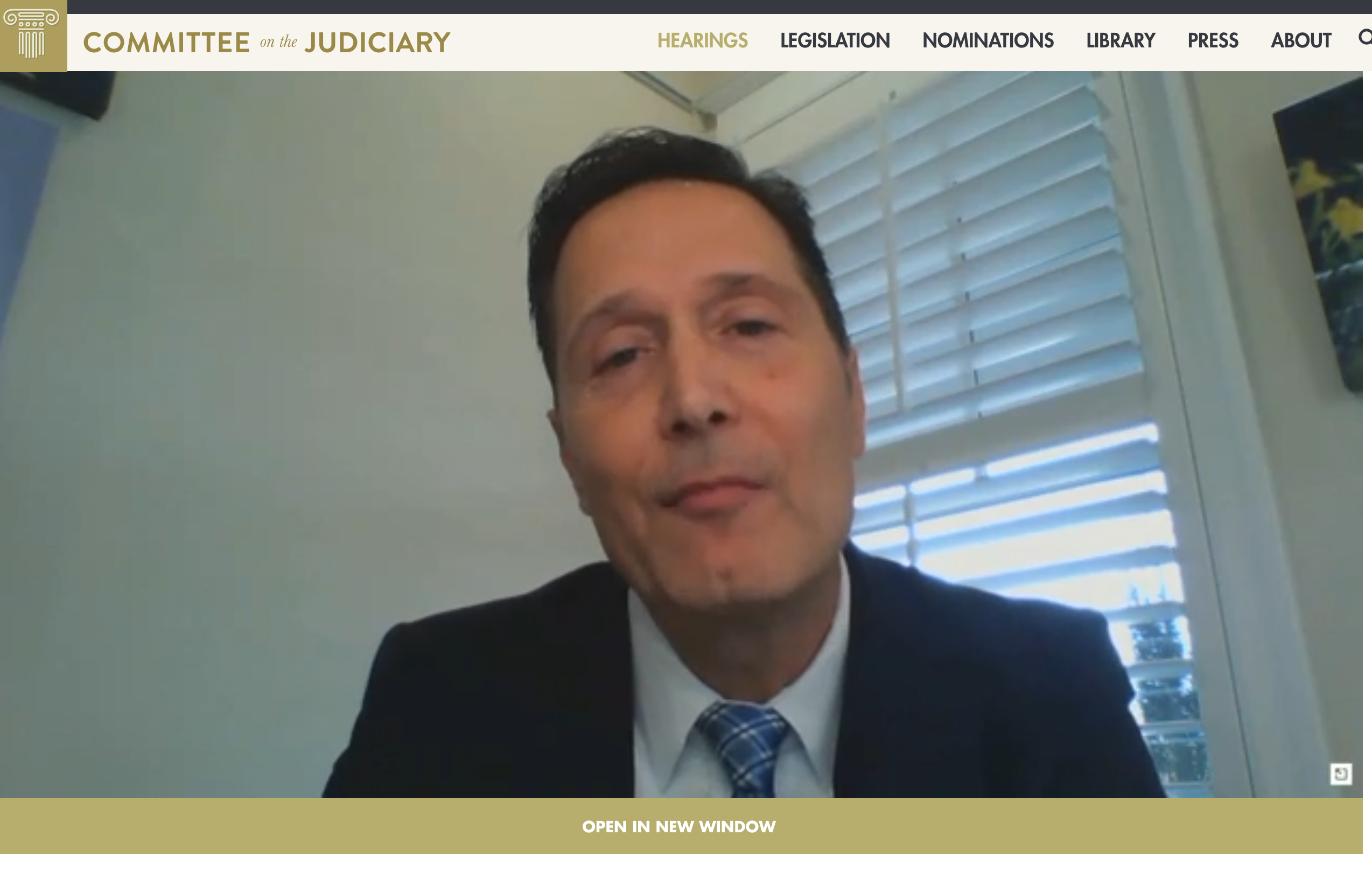
Mitch Glazier, RIAA
Glazier added that the DMCA was supposed to be a compromise to allow tech companies and creators to grow, but that music industry revenues are now 50% less than they were than when the DMCA went into effect, while revenues of some digital platforms are 500,000% more than they were. The intended balance is “askew, to say the least,” Glazier said.
With respect to YouTube’s Content ID in particular, many of the witnesses said not enough users have access to the tool, since eligibility criteria are strict and reserved mostly for large movie studios and music labels.
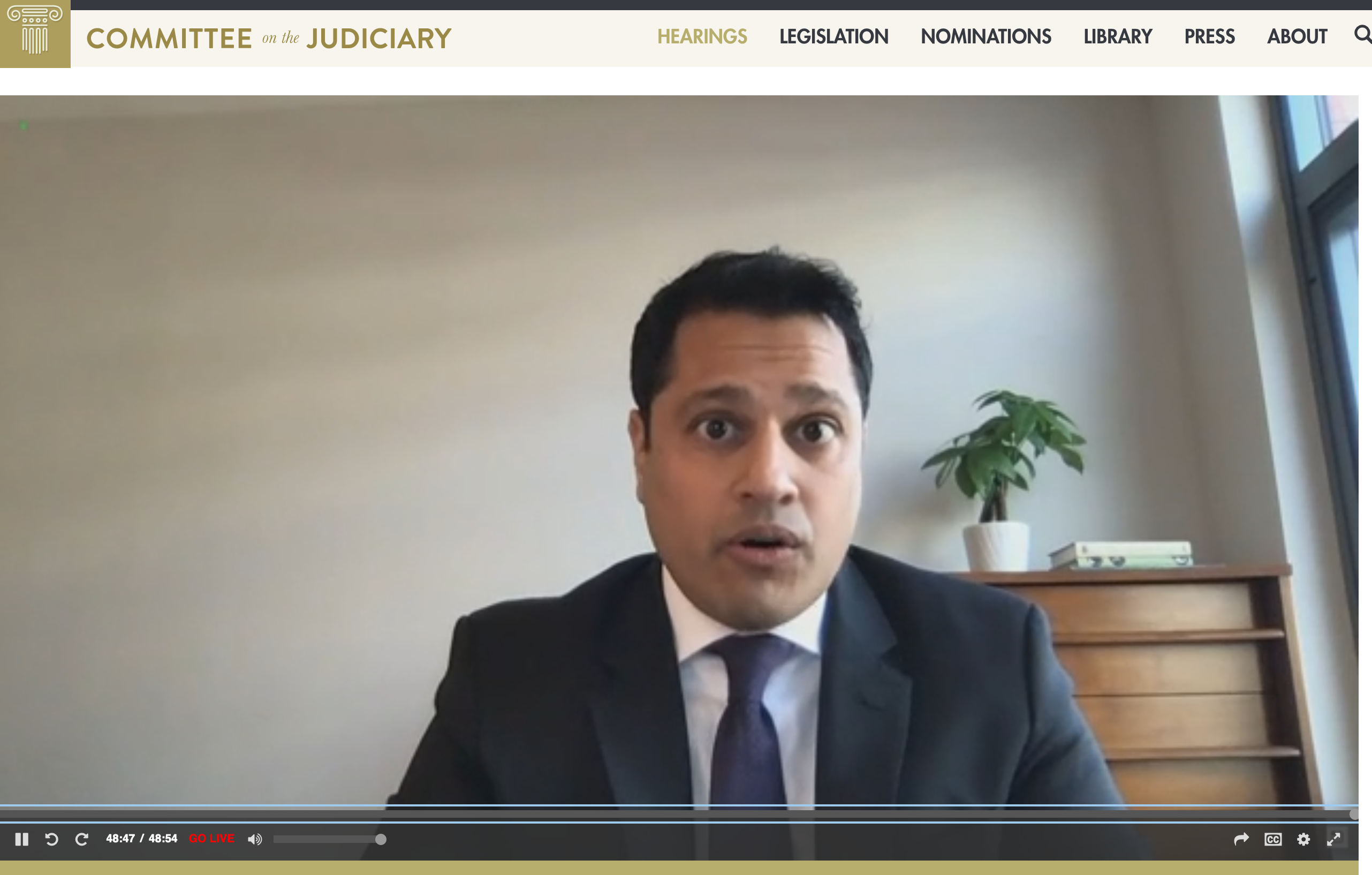
Probir Mehta, Facebook
Mehta said that the partnerships Facebook has formed with creators have been particularly important during the pandemic, as they have allowed creators to continue to grow their businesses amid shutdowns. He added that Facebook’s Rights Manager was developed collaboratively with rightsholders and helps creators to make decisions about what’s best for them. Mehta added that the company is presently testing machine learning techniques to identify and remove infringing content.
Glazier also expressed dismay with Twitter’s approach, and said that over the past two years the music industry has sent Twitter notices of over 3 million infringements for over 20,000 works. “This is piracy at an industrial, massive scale,” he said. “This is not some small problem. And Unlike Facebook and unlike YouTube [Twitter has] done nothing to at least build tools or to help prevent what is, by its nature, a viral system where piracy can spread literally in micro seconds. It all comes down to hiding behind these safe harbors.”
Getting Them to the Table
In the second panel, Katherine Oyama, YouTube’s Global Director of Business Public Policy, fielded some difficult questions from Tillis, IP Subcommittee Ranking Member Senator Chris Coons (D-DE), and her fellow panelists, who included Keith Kupferschmid, CEO at Copyright Alliance; Noah Becker, President and Co-Founder at digital rights management company, AdRev; and Dean Marks, Executive Director and Legal Counsel at the Coalition for Online Accountability.
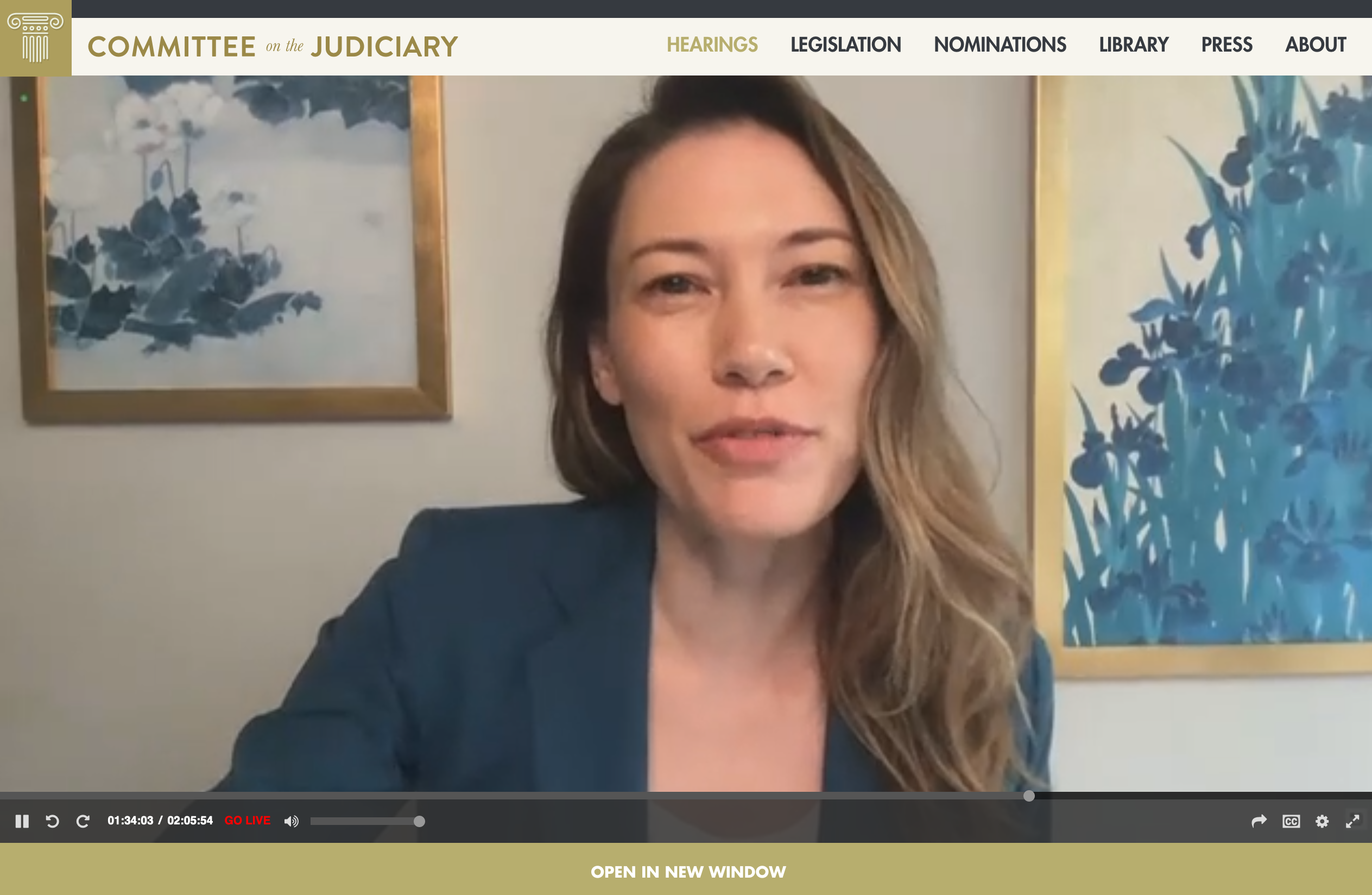
Katherine Oyama, YouTube
Oyama said that YouTube has paid out more than $5.5. billion in ad revenue alone from content claimed through the Content ID tool, and Coons noted that the company has invested more than $100 million in Content ID. Oyama also said that YouTube has responded to complaints about lack of access for smaller creators by expanding the Content ID tool via new tools like Copyright Match. “Everyone has access to our suite of copyright tools,” Oyama said.
Becker pushed back on that statement, and said that only copyright owners who participate in the YouTube platform can use Copyright Match. Becker was reading from the Copyright Match website, which emphasizes the following statement up front:
The Copyright Match Tool is only available to channels in the YouTube Partner Program. If you are not in the YouTube Partner Program, you won’t see the Copyright section of YouTube Studio.
However, Oyama denied the statement and said that one does not need to be monetizing on YouTube or a partner to use the tool.
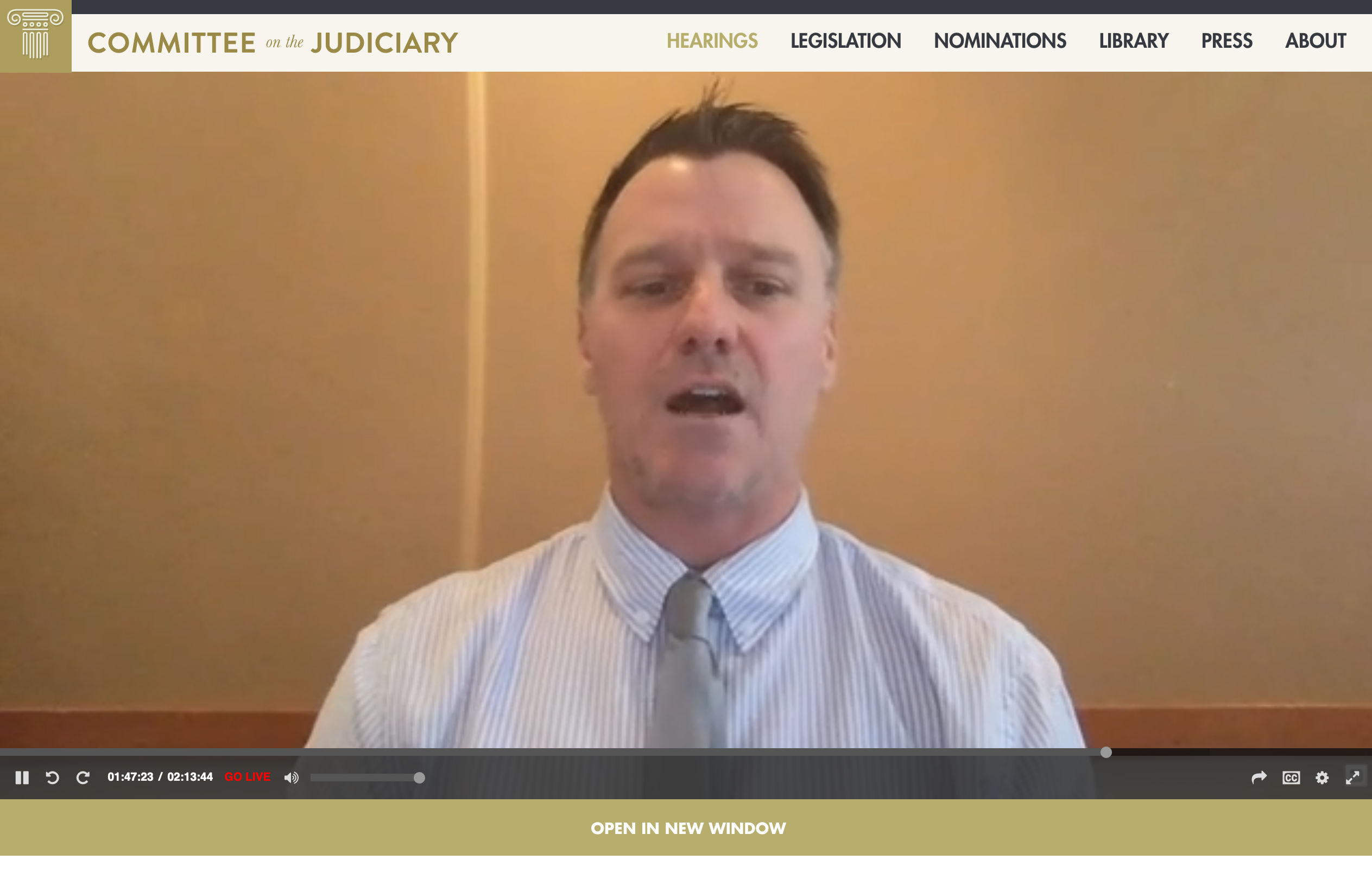
Noah Becker, AdRev
Becker also balked at Oyama’s response to Coons indicating that Content ID had grown out of a need for an organized approached to rights management that later became “very important to our business.” Becker pointed out that both YouTube’s Content ID and Facebook’s Rights Manager arguably were developed in response to threats of litigation—Content ID in response to the 2007 Viacom v. Google lawsuit and Rights Manager’s licensing efforts in response to mass takedowns from the RIAA and other organizations. “Nothing really voluntary is happening; there are threats of litigation that force these platforms to do what they do. They are reactive measures to litigations.”
Asked by Coons if he thinks there are ways to make progress outside of legislation, Kupferschmid said that, while he’ would like to say yes, “in reality that hasn’t happened.”
“Getting them to the table has been impossible. If Twitter will not respond to even a Senator, how are we going to get them to listen to us or to the wedding photographer or the songwriter? If I had some pom poms here, I’d say ‘We want action! We want action! But we can’t get it.”
Solutions in Sight
Proposed solutions largely echoed past hearings, including:
- Ensure that repeat takedown notices trigger a stay-down of the same infringing material on the same site;
- give creators the tools they need to monitor infringement of their own works;
- make it easier to send takedown notices (Glazier noted that some platforms required notices to be sent by fax until recently);
- create standard technical measures that are required of all platforms, as contemplated in Section 512(1) of the DMCA;
- get rid of safe harbors for platform liability.
The draft text of the DMCA reform bill will be published this Friday.

![[IPWatchdog Logo]](https://ipwatchdog.com/wp-content/themes/IPWatchdog%20-%202023/assets/images/temp/logo-small@2x.png)

![[[Advertisement]]](https://ipwatchdog.com/wp-content/uploads/2024/04/Patent-Litigation-2024-banner-938x313-1.jpeg)
![[Advertisement]](https://ipwatchdog.com/wp-content/uploads/2024/04/Artificial-Intelligence-2024-REPLAY-sidebar-700x500-corrected.jpg)
![[Advertisement]](https://ipwatchdog.com/wp-content/uploads/2024/04/UnitedLex-May-2-2024-sidebar-700x500-1.jpg)
![[Advertisement]](https://ipwatchdog.com/wp-content/uploads/2024/04/Patent-Litigation-Masters-2024-sidebar-700x500-1.jpg)

![[Advertisement]](https://ipwatchdog.com/wp-content/uploads/2021/12/WEBINAR-336-x-280-px.png)
![[Advertisement]](https://ipwatchdog.com/wp-content/uploads/2021/12/2021-Patent-Practice-on-Demand-recorded-Feb-2021-336-x-280.jpg)
![[Advertisement]](https://ipwatchdog.com/wp-content/uploads/2021/12/Ad-4-The-Invent-Patent-System™.png)






Join the Discussion
6 comments so far.
Anon
December 18, 2020 10:22 amBig money, big business, big tech, digital goods, and (frankly, imho) outdated business models ON a digital goods frontier — all lead to heavy dose of ‘sausage making.’
Morty
December 17, 2020 09:17 pm@B how can you possibly talk about capitalist greed on the content creator side while ignoring the fact that the platforms are fleecing the entertainment industry stakeholders scott-free under the current structure of the DMCA?
Jason
December 17, 2020 03:51 pmExcept these “reforms” wouldn’t only criminalize piracy. Someone using a copyrighted song in an Instagram story isn’t piracy. A Twitch streamer using copyrighted music in the background isn’t piracy. Yet under the new legislation, both of these people could be slapped with a felony charge. It’s draconian overreach by huge companies pouring money into senators’ pockets.
B
December 17, 2020 12:55 pmLike Sam said, where is the defense of Fair Use in all of this? While I realize that that’s technically a legal defense, it’s fairly factual to say that actual transformative work is being taken down by these people, and that by giving them even more power, it would only stifle creativity further. As someone who has been on Twitter for almost ten years, I’m not even sure what “piracy” is on Twitter. What, are people posting movies cut up in two five minute videos, tweeted in succession? It’s absurd. The issue is that corporations, for whom the copyrighted material they own, despite producing literally none of it themselves, merely providing a meager amount of capital to get it made so they can profit immensely off of it, want total and utter control over human behavior so that they can profit off of every nanosecond of what they hold rights to, even when it’s clearly being used in a transformative or critical way. It’s one thing to want to profit off of something you own the rights to, it’s a whole ‘nother thing to want to profit off of it until the end of time, and shutter any and all legal use of said works, simply because it’s used in a way that does not, legally, require licensing.
Capitalism has been eating itself alive in the recording and film industry since the late 70s…frankly, if the already draconian rules aren’t enough for you to protect your copyrighted works from “piracy”, maybe that’s the free market telling you your business model is ancient.
Aara
December 17, 2020 11:15 amThe problem isn’t the platform users, the problem is the music industry.
Sam Smith
December 16, 2020 09:30 pmKinda weird how they didn’t once mention how extensively the tools end up being abused by rights holders to take down content for which the creator has either bought a license to use infringing parts or the supposed infringement doesn’t even exist at all. All this while suffering absolutely no repercussions despite essentially making a false legal claim. If only there were equal motivation in government to clamp down on bad behaviour by rights holders as well.